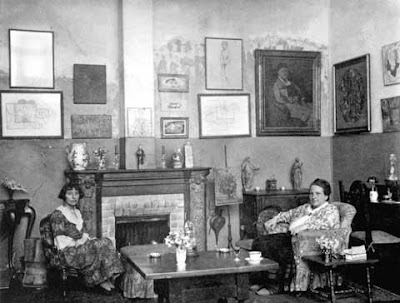Alice B. Toklas and Gertrude Stein and at 27 rue de Fleurus, the Stein salon
Writing is a solitary—and holy—act. But that doesn’t mean writers don’t benefit from the bonds of community, a topic I’ve been writing a lot about lately.
Community takes many forms. I’ve written in some detail about local writing events, which, when they occur with regularity, can do much to cement the bonds among writers.
Beyond literary happenings, a lot of writers love and depend on their writing groups. These may include formal workshops or, for those who are bypassing or finished with a formal writing education, a close group of writer friends who trade and comment on new work. I’ll bet these informal groups are a lot of fun, when it’s the right bunch—and it must be nice to have someone, or a few someones, who really know our writing goals and help us to recognize them so that we can focus our efforts to reach them.
I’ve never really been in a regular writing group, and I doubt I’d be much good to one. I’d be the person leading the conversation off track, or cracking wise, or doing any number of things to distract us from our purpose. If cocktail wieners are simmering, there’s no question about it—I’m eyeballing those wieners.
I think the reason I shy away from feedback groups is pretty straightforward: I don’t want feedback. And further, I’ve grown to resent the default position the declares readers to be de facto workshoppers.
The fact is that I’m not a fan of workshopping. It’s a thing that served its purpose in my student days, but now I’ve reached a point where I trust my work and my voice, and the feedback I need most is a “yes” or “no” from an editor. I’ve never really used input to revise a particular piece anyway, past small line edits; generally, workshop input, for me, demonstrates how my work is received by an audience, or it informs the general direction of future work.
While I welcome general opinions about my work—even negative ones, since not every attempt is a winner—I do not welcome uninvited suggestions for what to do to change my work. Something that is lost when we focus too much on workshopping is the ability to just be heard. I write poetry mostly, and I take my craft very seriously, but my poems are not craft projects. They are expressions. They come, sometimes, from my deepest self.
I hope my lack of desire for advice doesn’t read sensitivity. I’m really not thin skinned when it comes to my work. I’d prefer readers like my work, rather than dislike it, but either reaction is fine. The issue is that I find, more and more, that I just want to be heard—not fixed.
And isn’t that what community is—a group of people who listen and share and hear? Our very closest community members may be the ones we invite in for advice and counsel, but this isn’t necessarily true. Some people don’t want suggestions. Where my work is concerned, outside ideas, beyond finite suggestions of things like line edits, aren’t even usable, for the most part, because they are generally not in keeping with the way my work is born.
I guess that’s why I’m such a proponent of literary happenings—places where we can hear readings and have fun with language, maybe chow down on some finger foods. Sometimes community is about company in the journey—a sense that we’re not entirely alone, even though, as writers, this may be mostly true.


No comments:
Post a Comment